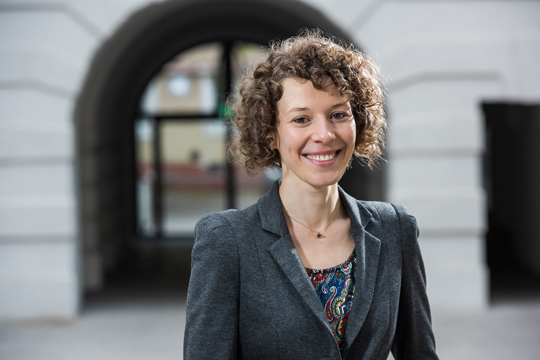More voices of women and younger people
Freiburg, May 11, 2020
The Leopoldina academy’s third statement was eagerly awaited - after all, the National Academy of Sciences and Humanities is advising the German government in the Coronavirus crisis. When the paper came out on 13 April 2020, there was praise, but also criticism. Critics said the concerns of parents had been given too little consideration - because although the paper discussed a gradual opening of schools, there was no mention of opening daycare centers. But what else is to be expected from a council of experts including only two women - and none of whose members are under 50? A group of early-career researchers read the recommendations carefully and wrote an open letter which was met with widespread agreement. The Freiburg sociologist Sina Leipold, assistant professor of Societal Transition and Circular Economy, was one of the letter’s initiators. Annette Hoffmann spoke with her.
 Sina Leipold is calling on the German government and the state premiers to include the expertise of those hardest hit in their decision making. Photo: Fiedels/stock.adobe.com
Sina Leipold is calling on the German government and the state premiers to include the expertise of those hardest hit in their decision making. Photo: Fiedels/stock.adobe.com
Professor Leipold, how did the open letter come about, and what do you aim to achieve with it?
Sina Leipold: After the Leopoldina recommendations were published, we - a group of young researchers, both female and male - were very concerned. We had the impression that above all the closure of schools and preschool care until the summer had not been thought through. Most of us work in research, many of us have children to care for - and are supposed to put in a full working week. Studies show that women carry out 70 percent of child care - even if they are also working. We are concerned that the crisis will mean a step backwards for equal opportunities. On top of that, some of us work in sustainability research and are worried that now - as in the financial crisis of 2008 - social models are being called for which have not been sustainable for a long time - models which contribute to the postponement of environmental, social and economic change. It’s about making decisions for the future.
Isn’t there a danger that the elderly will be played off against children? There are highly contradictory studies on how infectious children are.
The state of research is still relatively thin. There are researchers in favor of caring for children in small groups and seeing if it works - much as is being done with businesses now. The generations are played off against one another when one side has the impression that too much of the burden is being placed on its shoulders. If you don’t want to put the generations at loggerheads, you have to start a dialogue between them.
As a researcher, you can only make recommendations; the decisions are made by democratically elected politicians.
We don’t aim to usurp any democratic processes; we are simply bringing our expertise from various disciplines into the debate. Making the decisions is clearly the policymakers’ job.
 “If we don’t want to risk a new pandemic in a short time, the measures we take from now on have to be linked to climate and environment protection issues,” says Sina Leipold. Photo: Klaus Polkowski
“If we don’t want to risk a new pandemic in a short time, the measures we take from now on have to be linked to climate and environment protection issues,” says Sina Leipold. Photo: Klaus Polkowski
Right now there is the impression that the feeling of solidarity experienced in the first weeks of the shutdown is melting away. How can we create solidarity in society?
The period of isolation was key when it came to lowering the infection rates, but now it is about finding a future-oriented path out of that phase. It is about protecting those who are alive now - but also those who will live in the future. Many studies show that the virus is a result of the destruction of nature, because that has taken away wild animals’ habitats and we are not prepared for their viruses and bacteria. If we don’t want to risk a new pandemic in a short time, the measures we take from now on have to be linked to climate and environment protection issues.
You are currently working from home. Surveys show that a lot of people are quite happy working at home. But does it also contain pitfalls?
Working from home has a lot of advantages for commuters. But not many of them have a real home office, because they have to look after children. We don’t want a re-opening that is not thought through; we have parents and grandparents who we want to protect. The goal has to be to make decisions that are not fast, but sensible and carefully weighed. As academics we are very glad that the government is taking a science-based approach to dealing with the crisis. At the same time we want the expertise to be included of those who are most strongly affected by the crisis - and that is the younger generation. We think it would benefit the debate for the voices of women and younger people to be heard.

